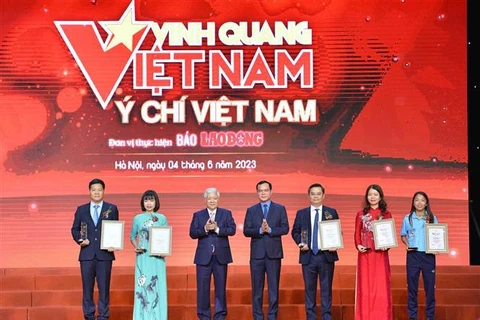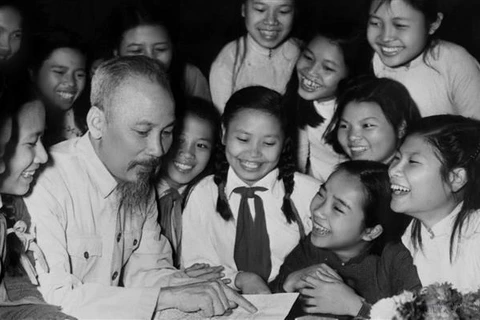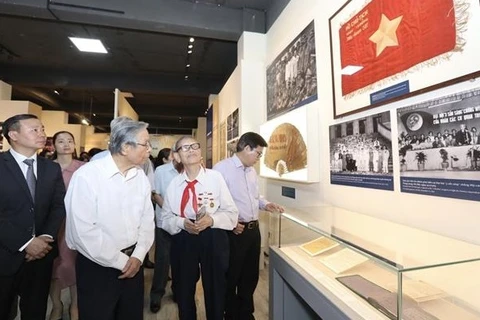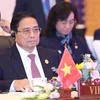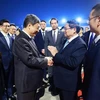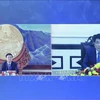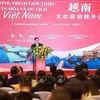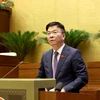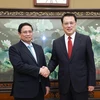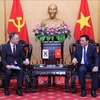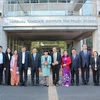Hanoi (VNA) - “Emulation is patriotic, those that are patriotic must emulate. And those who emulate are the most patriotic ones”, President Ho Chi Minh made the call for patriotic emulation 75 years ago.
It has been affirmed in the past 75 years that the ideology on patriotic emulation, under the leadership of the Party, was really a guideline for action throughout the course of the Vietnamese revolution.
On the occasion of the 75th anniversary of President Ho Chi Minh's appeal for patriotic emulation, Associate Professor and Doctor Bui Hoai Son, Standing Member of the National Assembly’s Committee on Culture and Education, spoke with VietnamPlus about patriotic emulation in today's situation.
A summons to people's strength
- Dear Associate Professor-Dr. Bui Hoai Son, could you please tell us the historical context leading to President Ho Chi Minh’s “Call for patriotic emulation" on June 11, 1948?
Assoc. Prof. Dr. Bui Hoai Son: 75 years ago, the resistance war against the French colonialists was at a difficult stage, with hunger and ignorance prevalent everywhere. The urgent task of the revolution at this time was to build and protect the revolutionary government, fight against the French colonial invasion, eliminate internal rebellion, and improve people's lives.
Mobilizing the strength of the entire nation was essential to accomplish this task. Therefore, President Ho Chi Minh called for all classes of society to participate in revolutionary activities and fight against the French colonialists. The "call for patriotic emulation" is seen as a summons to the people of the country, to encourage the spirit and strength of the people in the fight against the French colonialists.
- 75 years ago, Uncle Ho's appeal spread the spirit of emulation against hunger, ignorance, and foreign invaders. Today, the country's situation is much different. So can you tell me what messages and contents in the "Call for patriotic emulation" are still valid in today's life?
Assoc. Prof. Dr. Bui Hoai Son: Although 75 years have passed, President Ho Chi Minh's "call for patriotic emulation" remains intact, as it emphasizes patriotism and solidarity of the entire nation. This spirit is still very important in building and defending the country, uniting society and creating an environment of peace, stability and continued development.
Experiencing many difficulties and challenges, most recently the COVID-19 epidemic, we can realize the truth that the power of patriotism can help people overcome difficulties and conquer all enemies. It's an invaluable lesson from "The Call for Patriotic Emulation."
In addition, the content of the appeal really encourages all people to emulate for the common good of the society, improve their qualifications, in line with the aspiration to build the country set out by the 13th Party Congress’s resolutions.
In terms of culture, I think that President Ho Chi Minh's appeal is meaningful to the preservation of and promotion of the unique cultural values and traditions of the nation, contributing to building a civilized society, creating confidence in the process of international integration.
Public opinion has long condemned the state of emulation because of the so-called "achievement disease," which leads to unfair competition. What do you think about the effectiveness of today's emulation movements?
Assoc. Prof. Dr. Bui Hoai Son: Recently, I attended the opening of the exhibition "Resounding the Call for Patriotic Emulation" at the National Library.
I was really touched by the images of the patriotic emulation movement through the ages, with heroic examples in labour and combat such as guerrilla platoon leader Nguyen Thi Chien, soldier Ngo Gia Kham, Doctor Pham Ngoc Thach. These are the people who inspire others, creating confidence in the Party and the cause of building a socialist country.
It’s sad to see people who made achievements first but then broke the law. I think this may derive from the original goal. Instead of focusing on sustainable development, emulation movements are transformed into a race for individual or collective achievement.
In addition, the effectiveness of the emulation movement depends on how it is implemented and managed. If organized carefully and transparently, with clear regulations and proper oversight, emulation movements can promote growth and progress.
However, if not done properly, emulation movements can cause unfair competition, allowing other negative things to flourish. That is a problem that needs to be fixed in the near future.
-Can you name some emulation movements that have attracted the participation of everyone in society?
Assoc. Prof. Dr. Bui Hoai Son: Emulation movements launched by the Government such as "The whole country joins hands to build new countryside", "The whole country joins hands for the poor" have had successes and positive influences in social life.
Through the construction of new rural areas, people's lives and social security in many rural areas have changed significantly, creating a solid basis for sustainable development, strictly implementing the policy "leaving no one behind” in the process of national development.
The movement "The whole country joins hands for the poor" has encouraged disadvantaged areas. The government has implemented many policies on health insurance, education, housing construction support for the poor and poverty reduction programs.
The media and social organisations have also played an important role in raising public awareness about helping the poor.
As a result, the poverty rate has decreased significantly in recent years and many poor households have had better living conditions.
In particular, the movement has attracted social organisations and communities to join hands to raise funds to assist the poor, creating a spirit of solidarity and sharing in society.
Clear targets are needed to complete for the goal
- Culture is the foundation of a nation and emulation has made an important contribution to promoting the strength of Vietnamese culture imbued with national identity. With the motto "Drastic action - Aspiration to contribute", what has the cultural sector done and what are its limitations?
Assoc. Prof. Dr. Bui Hoai Son: I highly appreciate the efforts of the cultural sector in the past half term. Obviously, the interest of the Party and people in culture comes from the efforts of the cultural sector.
Notably, the preservation and promotion of Vietnam's cultural heritage values have been preserved, promoted and honoured both at the national and international level.
Cultural and artistic activities are more and more diverse, meeting the needs of the people.
The cultural industry has been focusing on developing and having certain achievements with quality art products and events, becoming brands for localities such as Ho Do international music festivals, Monsoon, Hue Festival, and Danang International Fireworks Festival.
At the Mid-term Conference of the 13th Party Congress held on May 17, 2023, Party General Secretary Nguyen Phu Trong affirmed: "Amid difficulties, socio-cultural fields continue to receive attention and investment and achieved many results in the spirit of closely and harmoniously combining economic development with socio-cultural development."
Despite many achievements, I see that there are still many bottlenecks containing cultural development. These bottlenecks are a result of both objective and subjective reasons, including limitations of mechanisms and policies, lack of human and financial resources, infrastructure and facilities for cultural development.
They are also a result of the quality and value of cultural and artistic products that are not high enough to compete with products of other countries.
- In your opinion, are there any measures to spread the meaning of emulation in society, especially in the cultural industry?
Emulation plays a very important role for every civil servant, worker and citizen. I really hope the emulation movement in the cultural industry will create conditions for the industry to have a breakthrough in cultural development in the coming years.
To meet that end, I think it is necessary to focus on the following issues: Firstly, it is necessary to set specific and measurable goals and targets, creating motivation for emulation activities.
Secondly, to mobilize the participation of the entire cultural sector and society, it is necessary to create motivation and encourage individuals and organizations to participate in cultural emulation activities.
Thirdly, it is important to strengthen communication and education to spread the meaning and value of emulation activities.
Fourthly, emulation in the cultural sector needs to create a spirit of solidarity and cooperation among individuals, organizations and localities. Thus, it is necessary to build a cultural community to take advantage of available resources.
Last but not least, industry leaders should encourage creativity, breakthrough thinking and testing new ideas in organizing emulation activities. Innovation and creativity help create new experiences that capture public interest and engagement.
I believe that, through these solutions, we can implement effective emulation, contributing to the cultural development of the country.
- Thank you very much!

